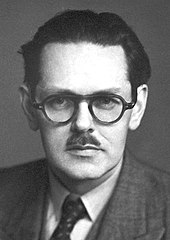Archer J. P. Martin
aus Wikipedia, der freien Enzyklopädie

Archer John Porter Martin (* 1. März 1910 in London; † 28. Juli 2002 in Llangarron) war ein britischer Chemiker und Nobelpreisträger.
Biographie
[Bearbeiten | Quelltext bearbeiten]1932 begann Martin ein Studium an der Universität Cambridge. Zunächst beschäftigte er sich dort mit physikalischer Chemie, später mit Ernährungswissenschaften. 1938 wechselte er zu einem Textilforschungszentrum in Leeds. 1948 wurde er Mitglied des staatlichen britischen Medical Research Council. Im Jahr 1950 wurde er Fellow der Royal Society.[1] Bis 1952 leitete er hier die Abteilung für physikalische Chemie des Nationalen Instituts für Medizinische Forschung, später war er chemischer Berater. Seit 1959 war er Direktor der privaten Abbotsbury Laboratories Ltd.
Nach seiner Pensionierung an der University of Sussex war er Gastprofessor sowohl an der University of Houston in Texas als auch an der EPFL (École Polytechnique Fédérale de Lausanne) in der Schweiz.[2][3]
Werk
[Bearbeiten | Quelltext bearbeiten]Martins Interesse an Biochemie wurde durch seinen Professor in Cambridge geweckt. Dort beschäftigte er sich mit der Isolierung von Vitamin E und den Auswirkungen von Vitamin-E-Mangel. Er entwickelte hierfür Methoden zur Extraktion und der Chromatographie.[4] Die Verteilungschromatographie entwickelte Martin während er an der Isolierung von Aminosäuren arbeitete.[5] Später forschte er an Vitamin B2 und einem Mangel daran. Neben vielen anderen Auszeichnungen erhielt Martin, gemeinsam mit Richard L. M. Synge, im Jahr 1952 den Nobelpreis für Chemie für ihre Erfindung der Verteilungschromatographie.
Weblinks
[Bearbeiten | Quelltext bearbeiten]- Informationen der Nobelstiftung zur Preisverleihung 1952 an Archer J.P. Martin (englisch)
- Informationen zu und akademischer Stammbaum von Archer J. P. Martin bei academictree.org
Einzelnachweise
[Bearbeiten | Quelltext bearbeiten]- ↑ J. Lovelock: Archer John Porter Martin CBE. 1 March 1910 -- 28 July 2002: Elected F.R.S. 1950. In: Biographical Memoirs of Fellows of the Royal Society. Band 50, 2004, S. 157–170, doi:10.1098/rsbm.2004.0012, PMID 15754473.
- ↑ Nobel Winner Archer Martin Dies. Abgerufen am 3. Juni 2021.
- ↑ Facebook, Twitter, Show more sharing options, Facebook, Twitter: Archer Martin, 92; Chemist Won Share of Nobel Prize in 1952. 6. August 2002, abgerufen am 3. Juni 2021 (amerikanisches Englisch).
- ↑ A J P Martin: Partition Chromatography. In: Annual Review of Biochemistry. Band 19, Nr. 1, 1950, S. 517–542, doi:10.1146/annurev.bi.19.070150.002505.
- ↑ A J P Martin, R L M Synge: A new form of chromatogram employing two liquid phases A theory of chromatography. 2. Application to the micro-determination of the higher monoamino-acids in proteins. In: Biochemical Journal. Band 35, Nr. 12, 1941, S. 1358–1368.
| Personendaten | |
|---|---|
| NAME | Martin, Archer J. P. |
| ALTERNATIVNAMEN | Martin, Archer John Porter (vollständiger Name) |
| KURZBESCHREIBUNG | britischer Chemiker und Nobelpreisträger |
| GEBURTSDATUM | 1. März 1910 |
| GEBURTSORT | London |
| STERBEDATUM | 28. Juli 2002 |
| STERBEORT | Llangarron |
Text is available under the CC BY-SA 4.0 license; additional terms may apply.
Images, videos and audio are available under their respective licenses.
